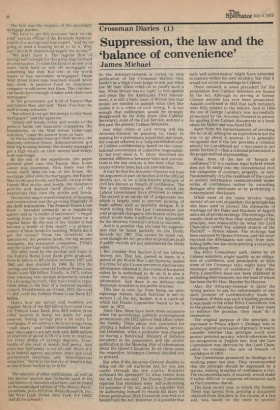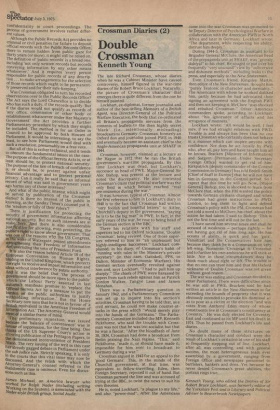Crossman Diaries (1)
Suppression, the law and the 'balance of convenience'
James Michael
So the Attorney-General is trying to stop publication of the Crossman diaries. One needn't be a High Court judge to ask just what law Mr Sam Silkin relies on to justify such a ban. While Britain has no 'right' to free speech and press like the Americans' First Amendment, it is still a basic tenet of British law that people are .entitled to publish what they like unless it is a crime or civil wrong. It is not enough that publication would be strongly disapproved by Sir John Hunt (the Cabinet Secretary), most of the Civil Service, and not a few past the present Cabinet Ministers.
Just what crime or civil wrong will the Attorney-General be pointing to, then? In arguing for a preliminary injunction last week, the counsel referred to a 'long-established rule' of Cabinet confidentiality based on the constitutional conventions of collective responsibility, but ever since A. V. Dicey described the essential difference between laws and conventions in the last century it has been clear that courts enforce laws, but not conventions, It may be that the Attorney-General will base his argument in part on Section 2 of the Official Secrets Act, or on a little-known principle of civil law known as 'breach of confidence.' The first is an embarrassing old thing which the Labour Government have promised to repeal. The second is an untidy bit of judge-made law which is largely used to prevent pirating of trade set`rets such as brassiere designs. It is worth noting that the Law Commission last year proposed changes to this branch of the law which would make it difficult if not impossible for the Attorney-General's action to succeed.
And it is possible that the case for suppression may be based partially on the Public Records Act 1967. This cannot be ruled out, even though the Act provides no penalties at all if public records are not sequestered for thirty
iieBaconsider first Section .2 of the Official rust.
Secrets Act. That law, passed in haste in a period of pre-World War I spy hysteria, makes it a crime for any Crown servant to disclose any information obtained in the course of his duties unless he is authorised to do so. It is also a crime for anyone simply to receive such information. And there is no defence that disclosure would be in the public interest. This law is very far from being an antiespionage statute, which function is left to section I of the Act. Rather, it is a catch-all which the Franks Committee found to be 'a mess' in 1972.
Since then, there have been three occasions/ when the government publicly contemplated prosecutions: the 1972 railway leak affair, when the Sunday Times editor was cautioned for printing a leaked plan to cut railway service; last December, when a journalist was charged for having a 'Restricted' Ministry of Defence document in his possession; and the recent publication in the Morning Star of information about the Queen's finances. In all three cases the respective Attorneys-General decided not to proceed.
But what if the Attorney-General decides to bring out the old warhorse Act for one last canter through the law courts, however awkward the spectacle? To what extent does the Act bind anyone? The Franks Committee reported that ministers were 'self-authorising for purposes of the Act, and it is arguable that by authorising himself to record his diary for future publication Dick Crossman was free at a bound from the Act. However, it is possible that such 'self-authorisation' might have extended to matters within his own ministry, but that it would not cover proceedings in Cabinet.
There certainly is some precedent for the proposition that Cabinet ministers are bound by the Act. Although no serving or former, Cabinet minister has ever been prosecuted, Asquith confirmed in 1915 that such ministers were fully subject to the statute. And in 1934 the son of George Lansbury was successfully prosecuted by the Attorney-General in person for quoting from Cabinet documents in a book about his father and was fined £10.
Apart from the embarrassment of invoking the Act at all, asking for an injunction is not the way to go about it anyway. It is generally recognised that if the law provides a criminal penalty for a prohibited act — two years in jail under Section 2 — then a criminal prosecution is the proper method of proceeding.
What, then, of the law of 'breach of confidence'? It is a curious legal hybrid which does not fit easily into the conventional civil law categories of contract, property, or tort. Fundamentally, it is the readiness of the courts to protect information communicated under terms of confidence, either by awarding damages after disclosure or by prohibiting a contemplated disclosure.
While most of the cases involve 'trade secrets' of one sort or another, the principle has also been used to protect the intimacies of marriage (of the Duke and Duchess of Argyll) and a set of private etchings. The etchings case, usually cited as the first clear statement of the principle, was noteworthy by what the Lord Chancellor called 'the exalted station of the Plaintiff — Prince Albert. The etchings had been executed by Queen Victoria, and the court enjoined the defendants not only from publishing them, but also from printing a catalogue describing them.
The Privy Councillors' oath, taken by all Cabinet ministers, might qualify as an obligation of confidence, and presumably at least some of the Crossman tales might have 'the necessary quality of confidence." But other Privy Councillors have not been inhibited in publishing their memoirs, not the least of whom has been the Rt. Hon. Member for Huyton.
Also, the Attorney-General is quite the wrong person to ask for enforcement of any such promise of confidentiality made by Crossman. If there was such a binding promise, it was made to the other Privy Councillors, not to the present Attorney-General. If they want to enforce the promise, they must do it themselves.
The original purpose of the principle, as expressed in Prince Albert v Strange, was to protect against an invasion of privacy. It was to consider whether that principle could now protect personal privacy, which otherwise has no recognition in English law, that the Law Commission was directed by the Lord Chancellor to consider the law of breach of confidence in 1973.
The Commission presented its findings in a working paper last year. They recommended that the principle should be expressed by a statute, making breaches of confidence a tort. The recommendations, if enacted, would make it rather difficult to suppress information such as the Crossman diaries.
The most recent case, in which the Sunday Times was barred from printing a document obtained from Distillers in the course of a law suit, was based on the need to protect
confidentiality in court proceedings. The Process of government involves rather different values.
Although the Public Records Act provides no criminal or civil penalties for failui-e to deposit official records with the Public Records Office, there to remain hidden from public gaze for thirty years (or more), it might still be relied on. The definition of 'public records' is a broad one, including 'not only written records but records conveying information by any other means whatsoever.' And it requires 'every person responsible for public records of any description ... to make arrangements for the selection of those records which ought to be permanently preserved and for their safe-keeping.'
Was Crossman obligated to turn his recorded, observations over to the Public Records Office? The Act says the Lord Chancellor is to decide who has such a duty, if the records qualify. But if the diaries would not qualify as records of 'any office, commission or other body or establishment whatsoever under Her Majesty's Government' the Act provides a further Parliamentary procedure by which they might be included. The method is for an Order in Council to be approved by both Houses of Parliament. It would be interesting, to say the least, to see how Parliament would deal with such a resolution, presumably on a free vote. But all of this is rather technical, and it tends to obscure the fundamental issues in the case. The purpose of the Official Secrets Acts is, or at least should be, to protect national security. The purpose of the law of breach of confidence is, or should be, to protect against unfair financial advantage and to protect personal privacy. Can it really be said that an informal record of what was said in government years ago harms any of those interests? And what of the public interest which might be served by publication of the Crossman diaries? Is there no interest of the public in knowing, as the Sunday Times's counsel put it, the 'wisdom or folly of their rulers'? There is justification for protecting the security of government information affecting national, security. But no such interests are at stake here. And there is also considerable justification for allowing, even protecting, the public's right to know about government. That was one of the reasons why the US Congress, iniffrWae of Watergate, passed amendments sthenkthening their Freedom of Information Act, overriding the veto of President Ford. It is also the reason behind Article 10 of the European Convention on Human Rights, binding on the United Kingdom, which protects the right to receive and impart information and ideas without interference by public authority.' And it was the belief that 'the process of government should be more open to the public' which the Labour Party asserted in last autumn's manifesto promise to 'replace the Official Secrets Act by a measure to put the burden on the public authorities to justify withholding information.' But the Home Secretary now says that he is not in favour of 'a British equivalent to the American Freedom of Information Act.' The Attorney-General would seem of a similar frame of mind. The preliminary injunction was issued because the 'balance of convenience' was in favour of suppression, for the time being. One thinks of the US Supreme Court's action in allowing publication of the Pentagon Papers, to the demonstrated inconvenience of President Nixon. The very issuing of the writ in this case has already gagged debate in Parliament under the sub judice rule. Strictly speaking, it is only in the courts that this vital issue may now be discussed. And the relish with which the Attorney-General's counsel referred to the thalidomide case is ominous. Even for discussions such as this.
James Michael, an America lawyer who worked for Ralph Nader (including writing Working on the System), is associated with the .Nader-style British group, Social Audit.



































 Previous page
Previous page